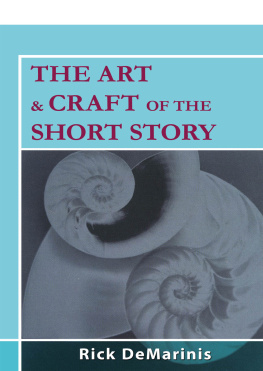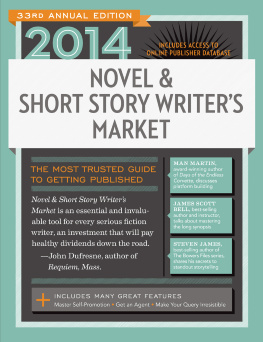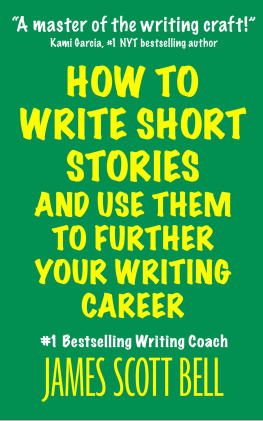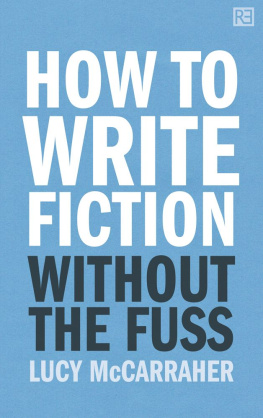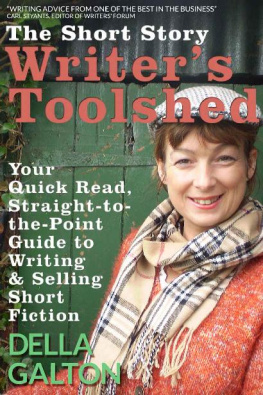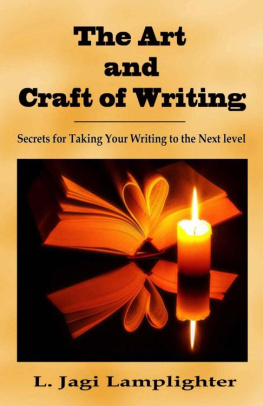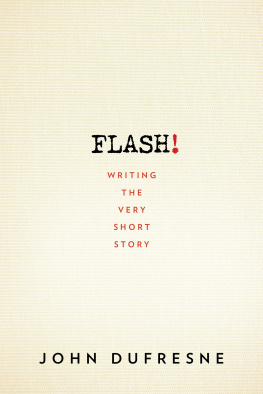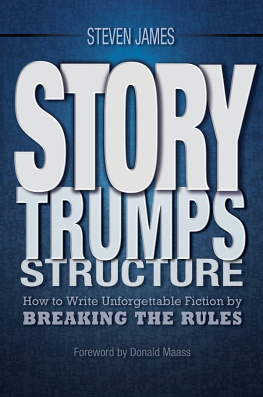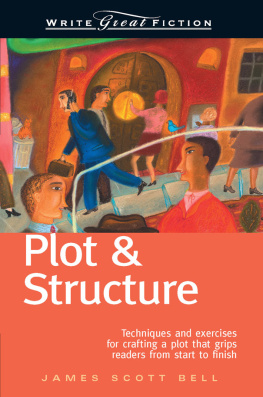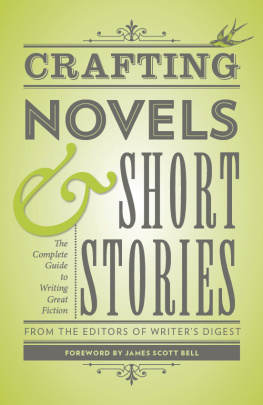The Art & Craft of the Short Story
Rick DeMarinis
My thanks to my wife, Carole Bubash,
who read this with a sharp and unsparing
eye, and to John Quinn for the use of his
fabulous floating library.
CONTENTS
FOREWORD
A WRITERS EDUCATION
I wasnt raised in a family of book readers. My mother worked in a fish cannery and my stepfather drove a bread truck. There were a few books in the housea library copy of Forever Amber no one had bothered to return; some mildewed paperbacks with racy covers; a beat-up leather-bound encyclopedia that expressed awe over a recent engineering miracle, the Eiffel Tower; and, amazingly, a beautiful, gold-embossed, wonderfully illustrated copy of The Life of Mohammed. (My mother was a fallen-away Lutheran, my stepfather a nonchurchgoing Baptist, and I, at fifteen, was a part-time Catholic and a full-time skeptic.) This small and exotic collection of books didnt make much sense, but it contained an essential message for a young aspiring writer: Dont expect things to make sense. Expect surprise.
In my high school English class, we were introduced to something called, with unmistakable reverence, Literature. I hated it. I remember having to read novels such as Silas Marner and Giants in the Earth. But the nebulous minds of fifteen-year-old California kids were hardly prepared for such fare. We traded ragged copies of Mickey Spillanes Mike Hammer novels out in the parking lot, away from the snooping eyes of teachers. A novel about gang warfare called The Amboy Dukes was hugely popular with us. We saw such fiction as extensions of our internal lives and could not make the great leap into the worlds of Eliot and Rlvaag. Im a lot older and a little wiser now, but I still expect what I read to be an extension of my internal life. If it doesnt resonate with something in me, I read with the same reluctance I had when I was fifteen.
Something happens to people destined for a life of writing that has nothing to do with Literature. It happens early in life and is probably the psychological equivalent of scarlet fever. It has to do with pain. In answer to the question, What is the best early training for a writer? Hemingway said, An unhappy childhood. Unhappy children (unhappy for whatever reasonsfrom physical abuse to psychological abandonment) grow up with the potentially destructive feeling that they have to seize the right to exist. They have been told in subtle and unsubtle ways that they have no rightful claim on life. These are the ones who get in trouble early and then go on to achieve impressive things, either good or badthe criminals and artists, the psychopaths and the self-made millionaires. An unhappy childhood often hones a powerful sense of injustice, and that very often is the core motivation for reformers, overachievers, criminals and artists. Dickens did not choose his subjects randomly; he was well acquainted with desperation and the torments of poverty.
People who grow up feeling justified and at home in their worlds can settle for less, having never felt the urge to pull things apart or to put them together again in gratifying ways. On the other hand, I know that people who have had wonderful childhoods have become first-rate writers in spite of this handicap (Eudora Welty comes to mind). Writers who had loving and protective parents, who never knew grinding poverty or emotional deprivation cannot be dismissed as not having suffered enough to qualify for the trade. Something happened to them. Maybe birth was trauma enough. Someone responsive to his or her surroundings, responsive in the sense of always being intensely aware, of noticing the details, of having no protective layers of dullness and disinterest, someone who is continuously being affected by the force of these impressionsthat is, a person destined to be an artist or a psychiatric patientwill find a wrenching experience waiting around every corner. A childhood doesnt have to be lousy to be traumatizing. As Flannery OConnor said, in regard to what one needs to know in order to become a writer, anybody who has survived his childhood has enough information about life to last him the rest of his days.
Then something else happens. We find that words can be an escape from the pain of social impotence. Words became, for me, a bright mantle of power. I discovered that pressing a no. 2 pencil into a sheet of clean white paper was a sensual experience. And as that pencil moved, a world was created. How amazing! (Its probably no coincidence that this impulse typically occurs right about the time of puberty.)
Creating fictional worlds is a natural refuge for the powerless, since it confers power. There on the clean white page, all power is restored. My English teachersexcept for that special teacher all of us seem to encounter, that mythic helper who appears just at the right time with the right kind of encouragementhad no perceivable passion for words, no respect for their rough or delicate strengths. With them, it was as if the literature they asked us to read was made of rarefied ideas breathed directly onto the page by pure mind from the high crags of Mount Olympus. They never once suggested that a human being with a quill or typewriter put the words down one by one with agony and joy.
The clatter and bang, the wheeze and chuffthe untamed music of our flexible languagemoved me like small earthquakes. Rarefied ideas were a vapor that would be condensed in college and graduate school much later. Besides, as a young teenager, I had no apparatus for absorbing serious ideas and surely none for expressing them. Writing was a physical exercise, as pleasureful as bench-pressing heavy weights, but not as socially acceptable.
My English teachers and I regarded each other through the wrong ends of our private telescopes. We shied away from each other, each perceiving the other as a possible enemy. And yet they gave me an occasional B or A for my awkward but imaginatively untethered essays and stories that twisted the world out of its expected shapes.
This habit of twisting the world persisted. If you twist hard and long, guided by intuition, it surrenders its truths. George Eliot knew that, Chekhov knew that, Joyce knew that. Everyone who has persisted in this art eventually comes to know that.
At first, short stories seemed the easiest of the narrative arts, the easiest way to become a writer. Why on earth did I think that? Well, because short stories were short. The novel seemed out of reach. How could anyone write a novel? Might as well decide to add a head to Mount Rushmore. You had to write four, five hundred pages to make a novel. Clearly, the short story was an easier form, the poem even easier.
My attitude has changed radically. Im convinced now that the shorter the form, the more difficult it is to write something worthwhile in it. (Emphasis here on worthwhile.) The novel will consume more of your time and calories, but I believe its harder to write a good short story than it is to write a good novel. Maybe this is prejudice. I dont think so. Ive written eight novels (six published) and hundreds of short stories, and writing the novelsonce the characters were in place and the story line more or less figured outwas like riding a runaway train. Short stories, however, always test my intuitive ability, my vision, my access to inspiration. These are the same uncompromising tests poets are subject to. (The poem, the most unforgiving of literary forms, lays the intelligence and vision of the poet naked. It will not suffer sloppy writing.)
Ive read a lot of comparative definitions of the novel and short story, many of which boil down to the truism: The novel is a long narrative, the short story not so long. Some have even used word-count limits as the ultimate dividing line: Anything over forty thousand words is a novel. Anything less than twenty thousand words is a short story. The no-mans-land in between belongs by default to the novella. I dont think this quantitative approach helps much. Frank OConnor, in his study of the short story,

